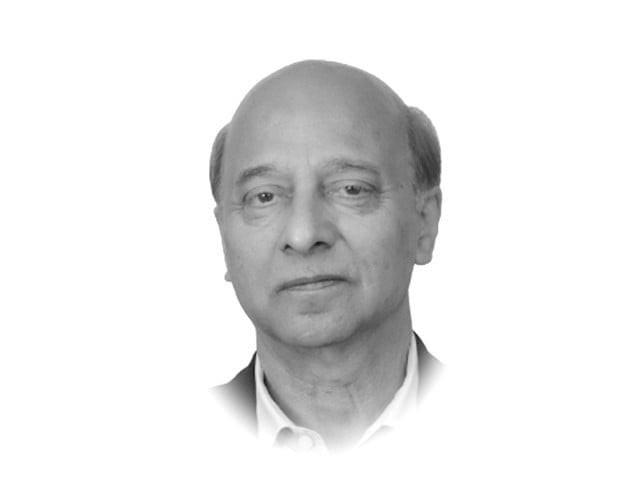Crisis of conscience, morality and rule of law

Imagine a teenager growing up in the West asking his parents or close relatives (associated with the civil administration or the civil-military security apparatus): Can you give me some bright spots on the state of the rule of law in Pakistan in the last decade or so? Do Pakistani prime ministers lie and cheat on the people?
What will stand out as salient features in response to the young man’s inquisition? Probably a mix of good and bad examples.
A blatantly false claim on the floor of the National Assembly by Prime Minister Shehbaz Sharif (June 28) that despite receiving 590 billion since 2010, the Khyber Pakhtunkhwa province has not been able to establish the Counter-Terrorism Department (CTD)?
Or the grotesque Iddat case relating to Imran Khan’s marriage to Bushra Bibi — one of the flimsiest episodes thus far in Pakistan’s history that brought nothing but ignominy to the country’s image across the globe?
How would even the judges stand up to their Harvard-Oxford-educated scions when confronted with the question of why they — to start with — agreed to entertain such a case? Isn’t it the blackest of stigmas?
Isn’t Nawaz Sharif’s disqualification on Iqama and salary from his son’s firm in Dubai yet another black spot for the judiciary, although the flats in London — and Sharif’s failure to provide the money trail for those properties — offered a much more solid case for conviction?
How about the incarceration on criminal charges — most of which fell flat the moment PDM came to power — of PML-N central leaders during the PTI government or the witch-hunt of PTI leaders after the April 2022 Vote of No-Confidence against Imran Khan? How will those at the helm of NAB explain and justify to their educated youth their successive actions against politicians?
And then there is the legal inaction against Khawaja Asif for receiving a 16,000 riyal monthly salary from a Dubai-based firm while holding the ministerial job? Wasn’t this a direct conflict of interest, or did Asif enjoy “immunity” for being a go-between, a messenger?
What should be said about the 2018 elections, when so-called electables were driven to join the PTI in droves, followed by controversies around the manipulation of results, or the Election Commission’s high-handed handling of the PTI in the run-up to the February 2024 elections?
Does the blatant arrest from the Islamabad High Court on May 9 of former prime minister Imran Khan, the nearly 200 criminal cases against him, or the thousands of arrests against PTI cadres in relation to the May 9 protests and violent actions across Pakistan qualify as legally correct at all?
Or what about the frivolous case involving 190 million pounds, wherein the entire amount sits in a government account, and has earned billions in interest, but the former prime minister is being accused of “siphoning off these 190 million”. The claim on “siphoning off” came from no other person but Prof Ahsan Iqbal, and one wonders where exactly is the “siphoning off”.
Hundreds, if not thousands, of hours, have gone into arguments for and against the cases instituted against Sharifs, Zardari and Khan. They have interchanged the roles, but one institution — the National Accountability Bureau (NAB) — remains intact, albeit with far fewer teeth than it used to possess. Its function, nevertheless, stays the same: a tool for “wayward” molding and bending opposition leaders — an exploitative tool at best for powers that be.
Or how would Azam Nazir Tarar, a prominent jurist, justify and explain his latest statements in response to the UN Working Group on Imran Khan’s detention and trials to, let us say, his own sons and daughters if they were the teenagers we talked about in the beginning?
In an opinion made public on July 1, the five-member working group of independent experts held that Imran Khan’s prosecution and detention in the so-called cipher and Toshakhana cases had “no legal basis” and were politically motivated to exclude him from competing in the political arena.
“The PTI founder is entitled to all rights under the national Constitution and laws, as well as international principles,” Tarar said, adding that Imran Khan was currently in jail as a convicted prisoner. “The arrest of the PTI founder and the pending cases are an internal matter of Pakistan,” Tarar responded in a statement issued via X.
How would Prof Ahsan Iqbal justify his doctorate title to the educated for the statement?
“People come to us and tell us if Pakistan has to progress, then Imran Khan will have to be kept in jail for five years. There is a voice of the people [that] Imran Khan should remain in jail for five years,” the planning minister told reporters recently.
In fact, he was resonating with the views (read plans) of many of his colleagues, who publicly insisted that keeping Imran Khan in jail was necessary for “economic stability”. This only smacks of hatred of Imran Khan and defies logic and common sense.
These assertions contravene the fundamentals of fair trial and justice and betray blind contempt for a political rival. How does a parliamentarian — a maker and defender of laws — justify his educational and democratic credentials? All this has embroiled Pakistan’s ruling elite in an unprecedented crisis of conscience, morality and the rule of law and is sinking its credibility ever deeper by the day.















COMMENTS
Comments are moderated and generally will be posted if they are on-topic and not abusive.
For more information, please see our Comments FAQ